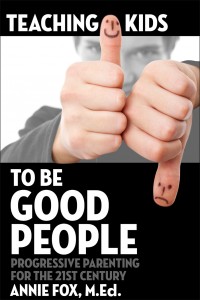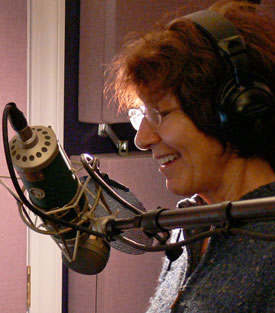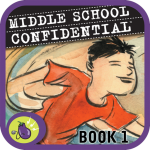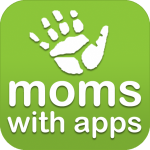|
|
September 19, 2012
Aside from giving birth to my own children, nothing provides me with more delight and a creative high than producing a new book. To find out why I decided, after 25 years of writing exclusively for kids, to write a book for adults, and why every parent and educator at least ought to explore Teaching Kids to Be Good People, please read the introduction.
____________
 The book I've been working on for 15 years
Obviously not all teachers are parents, but all parents are teachers. That’s convenient because good character traits, like empathy and respect, are teachable skills that need to be learned at home as well as at school. When we teach kids to be good people we help the world become a safer, saner, more equitable place for all of us. Nothing is more important than that!
But these are tough times for character educators. I know because I’ve been working in schools with students, teachers, and parents for more than 30 years as well as online since 1997. The job is getting harder. The values promoted by mass media work against us. What passes for entertainment is frequently mean-spirited. Character assassination in public discourse is the air we breathe, and the resulting pollution is a hazard to our well-being. It’s a huge problem, but what can we do?
When our kids plug in, which is most of the time, they encounter few positive adult role models. Online and off, our culture frequently ignores or rewards cruelty. This is why our children desperately need us to do a better job mentoring them in the direction of respect and kindness.
Our kids are good kids, but they are constantly challenged by the less-than-compassionate standards of their peers with whom they are mind-linked 24/7. Today’s teens suffer from status anxiety at levels no other generation has endured. This compels them to do whatever it takes to fit in, including things they are not particularly proud of. Despite these ubiquitous challenges I am confident we can teach our kids to be good people who actively seek opportunities to help others and who have the social courage to act on their good intentions.
We parent-educators are gardeners. We plant seeds and offer nurturing lessons that our kids can internalize. But we are not our children’s only influencers. By rededicating ourselves to teaching our kids to be good people, we provide them with the tools to do the right thing while we’re right there beside them and when they’re on their own. Whether they actually do it, is their choice. But at least we’ll know we’ve done our part well.
To help on our parenting journey, I’ve written this very personal and pragmatic guide that includes essays, podcasts, prompts, tools, questions, answers, and self-assessment quizzes all for the purpose of teaching kids to be good people.
How do you define a “good person?” That’s what I wanted to find out, so I crowdsourced the answer by posting the question. I received hundreds of responses. Eight concepts kept reappearing: Emotional intelligence, ethics, help, forgiveness, compassion, empathy, acceptance, and social courage—all essential, teachable skills. This book will help you teach them to your children or students. Hopefully, we’ll become so engaged in this process that we will inspire all of our children to become part of the solution.

January 17, 2012
(See UPDATES BELOW)
I’m writing my first book for adults since Armchair BASIC. It’s called: Teaching Kids to Be Good People. It will be available as an eBook in September.
Since one person’s “good” might be another person’s “Are you kidding me?!” I knew I needed to be precise from the onset. So I asked my twitter followers, plus many of my most thoughtful friends, colleagues and family members “How do you define a ‘good’ person?”
Lots of intriguing and insightful responses galloped my way and I’m grateful. My plan is to dissect each one… all in good time. But at the moment, I’m focused on forgiveness.
That’s an aspect of “goodness” I hadn’t considered. Probably says something about me. I mean, I have overstayed my welcome at the Self-Pity Party, ahem… once or twice. So when one especially kind-hearted friend offered me this nugget: “A good person is forgiving”, like a dog and a flying tennis ball, I was on it. Thinking. Thinking. Thinking.
- What does it mean to be forgiving?
- How do you actually forgive someone? Which muscle do you relax or clench?
- What’s the connection between forgiving and forgetting? Are they mutually exclusive?
- What might you gain by holding on to your resentment? Anger? Self-righteous indignation?
- What might you lose?
- Why is it so $#*@ hard to permanently unplug a memory that continues to wound each time you project it onto your mental movie screen?
These are open ended questions, my friends. I don’t know any useful answers… yet. Love to hear your thoughts.
fyi, in the next 6 months, I’ll be talking about teaching kids to be good people at the 18th Annual Character Education Conference in St. Louis, the INTASE Educators’ Conference in Singapore, and at the 19th National Forum on Character Education in Washington, DC.
_______________
UPDATE 3:13 pm Today (9/14/12): The book is finished! And I’ve had only enthusiastic early reviews, including these:
- “Annie Fox has a genuine passion for helping our young people and she has many years of experience doing it. Both are evident in this wonderful resource for parents and teachers. It’s full of insight, wisdom, good stories, and most important – practical advice. I highly recommend it for anyone wanting to help our kids become good people.” –Dr. Hal Urban, author of Life’s Greatest Lessons and 20 Gifts of Life
- I can’t express enough how much I love Annie’s work. Having worked in this field for so long, it becomes increasingly difficult to read new thoughts and ideas. Every time I read something of Annie’s, it makes me think. She writes about subjects with such compassion, insight and practicality that you can’t help but love all that she does. Great book-a great job Annie!” –Sarah Newton, author of Help! My Teenager is an Alien!
- “Another work of magic from what I have come to know as a master in the field. Sharing actual scenarios and follow up ideas, helps to keep readers connected to Annie’s ideas in a way that most parenting books fail to do.” –Joe Bruzzese, author of A Parents’ Guide to the Middle School Years and Founder of Sprigeo.com, the online bully reporting system
- “Finding positive, empathetic role models is often difficult but this wonderfully practical and warm hearted eBook is a great place to start. It will empower parents with some really helpful suggestions and ideas that will help you to navigate the choppy emotional waters of raising great adults.” –Sue Atkins, author of Parenting Made Easy – How to Raise Happy Children
This early feedback, especially coming from these excellent parent educators, has touched and encouraged me. The book is done, so what am I waiting for? Nothing, except to finalize the cover design. That won’t take long. As promised, before the sun sets on the last day of September 2012, Teaching Kids to Be Good People, will be available to everyone interested in raising young adults of good heart and mind. If you’d like to receive an announcement when the book is available, shoot me an email and I’ll let you know… personally.
_____________
UPDATE (10/3/12): I’m very pleased (and excited) to announce Teaching Kids to Be Good People is now available in print and also on Kindle. Here’s an excerpt from the introduction:
We parent-educators are gardeners. We plant seeds and offer nurturing lessons that our kids can internalize. But we are not our children’s only influencers. By re-dedicating ourselves to teaching our kids to be good people, we provide them with the tools to do the right thing while we’re right there beside them and when they’re on their own. Whether they actually do it, is their choice. But at least we’ll know we’ve done our part well.
To help on our parenting journey, I’ve written this very personal and pragmatic guide that includes essays, podcasts, prompts, tools, questions, answers and self-assessment quizzes all for the purpose of teaching kids to be good people. How do you define a “good person?” That’s what I wanted to find out, so I posted the question and received hundreds of answers. Eight words kept reappearing: Emotional intelligence, ethics, help, forgiveness, compassion, empathy, tolerance and social courage — all essential, teachable skills. This book will help you teach them to your children or students. Hopefully, we’ll become so engaged in this process that our teaching will inspire all of our children to become part of the solution.
Look for an announcement next month! In the meantime, if you’d like a personal email when the Teaching Kids to Be Good People is available, let me know.

November 12, 2011
 Annie Fox, coming soon to a radio near you. You know how sometimes a conversation can be life-changing? We had one of those yesterday. Even before we finished talking, we knew we were on to something. It was raining. Good day to be inside. Me and David and two neighbors around our dining table. And yes, there were muffins involved. Let me just say for the record, Robin Gianattassio-Malle and Rose Malle-Gianattassio aren’t just folks we wave at while walking the dog. These women are seasoned, savvy professionals in the areas of media production and business strategies with their own Blue Egg Media company. David, Rose, Robin and I are also kindred spirits. And friends. Lucky for us.
What started as a general question “What are your goals for the coming year?” turned into… “Let’s create a radio show where Annie talks about raising healthy kids by answering parenting questions. And since there’s nothing more compelling than actually hearing the voice of a parent describing what they’re going through, let’s bring in those voices.”
So we’re creating a pilot for a radio show. First step, collect the voices of people who could use help with a parent-child relationship. If you’re interested in getting your parenting question answered in a future radio show, please call 415.ASK.AFOX (415.275.2369) and leave a voice mail message. By leaving your question on our voice mail, you give us permission to use your voice recording. You can include your name if you want to or not, but we will need your email address. Even if we don’t use your recording in the show, I promise I’ll answer your question anyway.
Oh, and one other thing, when you call, you won’t be put “live” on the air so don’t worry about how you look. It’s just a recording.
That’s it. That’s the big idea. I can help you and together we can help other parents. Just call 415.ASK.AFOX and tell me about your current parenting challenge. I’ll take it from there.

May 6, 2011
 "Be Confident" on sale for $.99 (May 6, 2011 only) Fridays are inherently cool. App Fridays are especially welcome because that’s when Moms With Apps* features their weekly link exchange of family-friendly apps. And guess who’s featured today? That would be me and David (aka Electric Eggplant). Which is why, for today, Friday, May 6th 2011, our Middle School Confidential app (aka Be Confident) is on sale for 99 cents. Got a 4th-8th grader? Got access to an iPad. For $.99 you can give that kid you love something (s)he wants more than anything… the gift of confidence to be who they really are.
 MWA: seeking to promote quality apps for kids and families *Never heard of Moms With Apps!? Let me tell you, for newbie app developers like me and David, this wonderfully supportive consortium that’s committed to quality kid and family content, has been the difference between stumbling and bumbling on all-fours vs. having a lighted path to walk on. We’re grateful for their friendship and ongoing support, so here’s a plug for them. They’ve launched their own app the Moms With Apps App Catalogue (of apps, of course!) Check ’em out.
Update (May 7th, 2011): Our app has now returned to its normal price of $3.99. Download our Be Confident iPad app.
 — Older Posts »
| |














